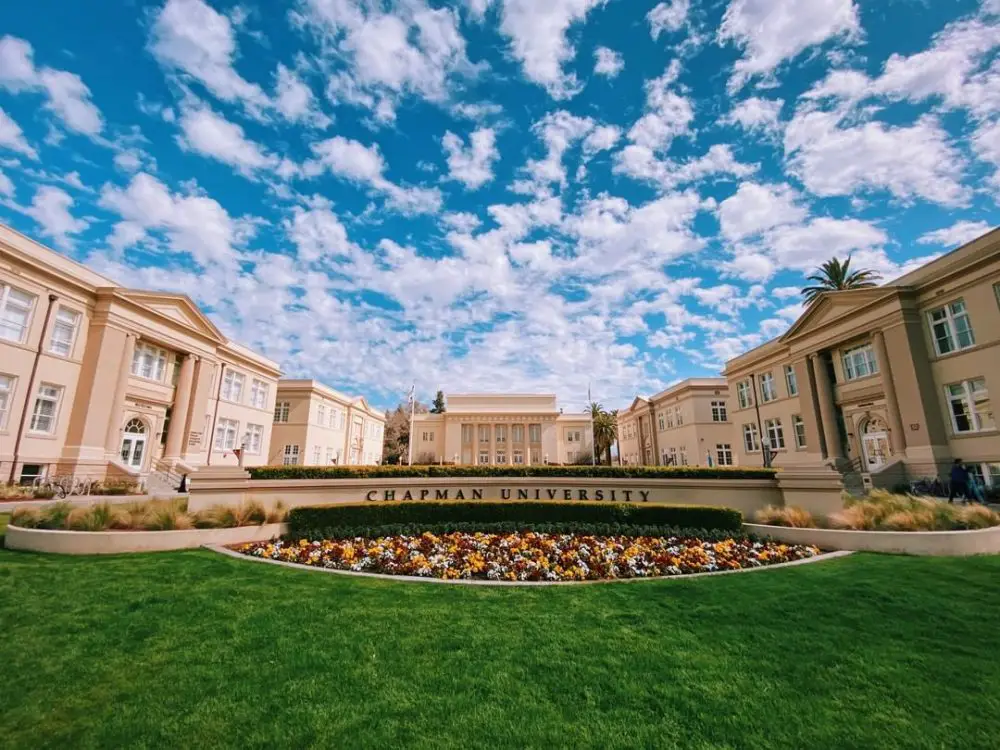On Aug. 29, student and faculty protesters organized en masse outside Chapman University’s Memorial Hall. The reason? Only weeks before, a tenured Chapman University law professor named John Eastman made headlines with a Newsweek article that questioned the citizenship of Democratic vice presidential nominee, Kamala Harris. Not only did his piece garner the admiration of Donald Trump — an original proponent of racist “birther” conspiracy theories — it also popularized baseless attacks on Harris’ status as a first-generation American.
The recent Chapman University protest wasn’t organized to debate the validity of Eastman’s statements. It didn’t need to. By Aug. 29, Eastman’s article — which argues a radical perspective that the 14th Amendment doesn’t guarantee birthright citizenship — had already been thoroughly debunked and rejected by an overwhelming majority of academics and fact-checkers. It also explores the xenophobic assertion that Harris and other first-generation Americans could betray the United States government because of their heritage — a notion that’s been ridiculed by conservatives and liberals alike.
These bigoted undertones (if one can call them undertones) are what brought protesters to Memorial Hall this past week. Many in the Chapman community wish for the university to take a stronger stance against the prejudices of Eastman’s article and commit to denouncing those same prejudices elsewhere on campus.
Preceding the protest, over 200 faculty members at Chapman University petitioned for its administration to reaffirm a commitment to diversity and inclusion in response to the Newsweek piece. Similarly, the Black Student Union on campus implored Chapman University President Daniele Struppa to re-examine the review process by which faculty receive tenure, noting how Eastman’s unconstitutional stance on citizenship had been published years earlier.
While Struppa has responded to these concerns through school-wide emails and public statements, most of them are diluted, tiptoeing around the idea that Eastman is in the wrong but never refuting his statements outright. As a result, Chapman University remains in a stasis that is all too familiar, often acknowledging discrimination only when an incident is public enough to damage the school’s reputation.
What Struppa and other administrators don’t appear to comprehend is that this inaction has become the very reputation of Chapman University. Eastman’s ability to sit comfortably in his tenured position and preach intolerance is merely the latest symptom of an attitude that prioritizes the well-being of Chapman University over its community.
Bigotry Beyond “Newsweek”
To clarify: Professor John Eastman is a bigot. As discussed previously, his article capitalizes on Obama-era birther sentiments and xenophobic depictions of immigration as a potential tool for tyrants to overthrow the United States. If that weren’t enough to warrant a public statement on his extreme views, Chapman University should also consider the fact that Eastman is the current chairman of the board for the ironically-named National Organization for Marriage (NOM), a vocally anti-LGBTQ+ organization that was created in 2007 to advocate against same-sex marriage.
Imagine walking into a class knowing that its professor is actively working to undermine your civil rights. For LGBTQ+ students at Chapman University, Eastman has made this a reality. NOM not only opposes same-sex marriage, but it has also fought against adoption by same-sex couples and the right for transgender students to use bathrooms that correspond to their gender identity. As a leading member of NOM, Professor John Eastman advocates for discrimination, plain and simple.
Earlier this year, a widely publicized incident on campus saw an intoxicated student yelling homophobic and racist slurs. Videos of the event went viral, and an email on Feb. 4 by President Struppa titled “Information on Campus Incident Today” went out to the Chapman community. “This type of behavior is absolutely not tolerated. Together, we must create a safe environment for all students, faculty and staff,” the email stated, going on to apologize to the Black and LGBTQ+ communities within Chapman University.
What defines “this type of behavior”? In comparison, is Eastman’s public encouragement of discrimination exempt from being considered homophobic (and therefore not tolerable) simply because, in his various attacks on LGBTQ+ rights, he hasn’t used slurs? If so, this indicates that Chapman is merely concerned with how profane the discriminatory actions of its faculty and students are, and not with how much they truly step on the well-being of others within the community.
Some may argue that, because Eastman is not advocating for discrimination within Chapman University, the school has no right to comment on his bigotry elsewhere. Putting aside the fact that NOM has worked to specifically decrease universities’ recognition of transgender students, Eastman’s views and actions are inseparable from his presence on campus — especially for those who his efforts have compromised.
Setting a Precedent
In the Aug. 17 school-wide email “Chapman’s Commitment to Diversity,” we find an argument commonly used by Chapman University and President Struppa against condemning statements like Eastman’s Newsweek entry: “… if anyone in a position of authority were to publicly criticize faculty work, it would create a dangerous chilling effect on the culture of academic freedom that defines a university.”
While Chapman University has often concerned itself with setting precedents — especially surrounding free speech — it is unfortunate that there is little dissenting concern for any “dangerous chilling effect” on students explicitly targeted by Eastman’s open homophobia, transphobia, xenophobia and racism. When intolerant attitudes are so deeply rooted in the leadership of an establishment, as is the case with Eastman’s tenure, Struppa’s “culture of academic freedom” becomes conditional.
What kind of precedent does Chapman University establish when it refuses to address a faculty member’s work to delegitimize an entire subset of the school’s community? Surely Chapman’s leadership must realize that the Fowler School of Law’s former dean equating homosexuality to “barbarism” doesn’t exactly welcome LGBTQ+ students and faculty to the school’s academic table, for instance. Is a failure to confront and dismiss bigotry truly what Struppa and other administrators consider to be academic tolerance?
Academic Freedom and Fighting Bigotry
Upholding free speech and condemning Eastman’s statements — contrary to the language of Struppa’s emails — are not mutually exclusive choices. A recent Los Angeles Times article proposes that Chapman University follows the example of CSU Long Beach, whose Academic Senate published a formal rebuttal to the anti-Semitic and white supremacist attitudes expressed by faculty member Dr. Kevin MacDonald.
In doing so, the university was able to take a stand against bigotry while actually contributing to, not silencing, open discussion in a public forum. Censorship wasn’t necessary to clarify how CSU Long Beach not only didn’t support but also vehemently opposed MacDonald’s blatantly discriminatory theories.
Struppa’s Aug. 19 email, “The ideals of inclusion and diversity at Chapman,” initially encourages a similar approach to condemning prejudice within the Chapman community. “We can call out injustice, we can and should debate, disagree and engage in civil discourse,” it emphasizes, but Struppa unfortunately stops short of applying these virtues to Chapman University as a larger entity: “… I can be personally outraged but at the same time I also have a responsibility as a president to respect all that it means to be a university.”
As such, Eastman and his many attacks on marginalized communities remain unchallenged by Chapman University in any official capacity. Other assertions like “… our personal values are at odds with what it means to be a part of an academic community,” illustrate an attitude within the Chapman administration where outrage at bigotry is associated with the personal feelings or beliefs of individual students and faculty, instead of a greater common understanding of what is and isn’t discrimination. This dangerous notion frames Eastman’s opposition as little more than an emotional mob that disregards the nuance of intellectual conversation in a blind rage. The reality is that Eastman’s discriminatory messages have been veiled by his academic rhetoric, providing him a convenient opportunity to condemn opposition as merely “anti-intellectual” when they are in fact resurfacing the simple prejudices that influence his writings.
One Step Forward, One Step Back
Despite the many problems with Chapman University’s approach to fighting bigotry, there have indeed been several substantial initiatives to build upon the school’s inclusivity. “My commitment to diversity and inclusion has never been stronger and I refuse to let the actions of a few define who we are as an institution,” notes Struppa in the same Aug. 19 email. These developments deserve to be applauded and demonstrate an interest in furthering opportunities at Chapman University, but unfortunately cannot negate the harmful effects of Eastman’s recent xenophobic statements or his long-running work with NOM.
While, as Struppa noted, Professor John Eastman is only one voice within Chapman University, he is nonetheless still a part of the school’s collective identity. Recent events have only heightened his influence on the university’s image. Just as we cannot overlook the commitments Chapman has made to better itself, we also cannot overlook its flaws and continued inability to condemn — let alone recognize — bigotry.

















